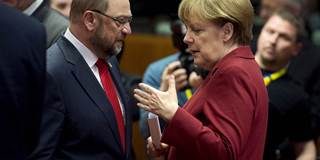Donald Trump thinks Germany's massive current-account surplus reflects currency manipulation and import restrictions. But, while the German external balance is indeed a problem, the best way to address it has nothing to do with the exchange rate or trade policy.
HAMBURG – For US President Donald Trump, the measure of a country’s economic strength is its current-account balance – its exports of goods and services minus its imports. This idea is of course the worst kind of economic nonsense. It underpins the doctrine known as mercantilism, which comprises a hoary set of beliefs discredited more than two centuries ago. Mercantilism suggests, among other things, that Germany is the world’s strongest economy, because it has the largest current-account surplus.
In 2016, Germany ran a current-account surplus of roughly €270 billion ($297 billion), or 8.6% of GDP, making it an obvious target of Trump’s ire. And its bilateral trade surplus of $65 billion with the United States presumably makes it an even more irresistible target. Never mind that, as a member of the eurozone, Germany has no exchange rate to manipulate. Forget that Germany is relatively open to US exports, or that its policymakers are subject to the European Union’s anti-subsidy regulations. Ignore the fact that bilateral balances are irrelevant for welfare when countries run surpluses with some trade partners and deficits with others. All that matters for Trump is that he has his scapegoat.
Back in the real world, the explanation for Germany’s external surplus is not that it manipulates its currency or discriminates against imports, but that it saves more than it invests. The correspondence of savings minus investment with exports minus imports is not an economic theory; it’s an accounting identity. Germans collectively spend less than they produce, and the difference necessarily shows up as net exports.

HAMBURG – For US President Donald Trump, the measure of a country’s economic strength is its current-account balance – its exports of goods and services minus its imports. This idea is of course the worst kind of economic nonsense. It underpins the doctrine known as mercantilism, which comprises a hoary set of beliefs discredited more than two centuries ago. Mercantilism suggests, among other things, that Germany is the world’s strongest economy, because it has the largest current-account surplus.
In 2016, Germany ran a current-account surplus of roughly €270 billion ($297 billion), or 8.6% of GDP, making it an obvious target of Trump’s ire. And its bilateral trade surplus of $65 billion with the United States presumably makes it an even more irresistible target. Never mind that, as a member of the eurozone, Germany has no exchange rate to manipulate. Forget that Germany is relatively open to US exports, or that its policymakers are subject to the European Union’s anti-subsidy regulations. Ignore the fact that bilateral balances are irrelevant for welfare when countries run surpluses with some trade partners and deficits with others. All that matters for Trump is that he has his scapegoat.
Back in the real world, the explanation for Germany’s external surplus is not that it manipulates its currency or discriminates against imports, but that it saves more than it invests. The correspondence of savings minus investment with exports minus imports is not an economic theory; it’s an accounting identity. Germans collectively spend less than they produce, and the difference necessarily shows up as net exports.